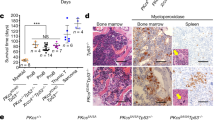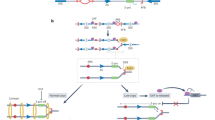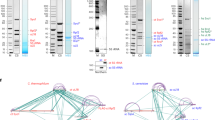Abstract
RECENT studies suggest that processing of ribosomal precursor RNA might be impaired in blast cells of acute leukaemia (AML)1,2. Following incubation with 3H-methyl-methionine blast cells of human acute leukaemias partially failed to methylate the 45S and 32S ribosomal precursors1. Using autoradiographic techniques, previous studies have also shown an increase in intranuclear RNA and decreased cytoplasmic RNA in these cells3. More recently, competitive hybridisation was performed with normal lymphocyte DNA and 35S–55S RNA fractions extracted from both acute leukaemia blast cells and normal PHA-stimulated lymphocytes. Using incubations with actinomycin D these experiments have led to the conclusion that leukaemic blast cells synthesise heterogeneous nuclear RNA molecules which are not transcribed in PHA-stimulated lymphocytes and it was also suggested—in contrast to the earlier data—that the amount of unmethylated unprocessed rRNA precursor was small in leukaemic blast cells4.
This is a preview of subscription content, access via your institution
Access options
Subscribe to this journal
Receive 51 print issues and online access
$199.00 per year
only $3.90 per issue
Buy this article
- Purchase on Springer Link
- Instant access to full article PDF
Prices may be subject to local taxes which are calculated during checkout
Similar content being viewed by others
References
Torelli, U. L., Torelli, G. M., Andreoli, A., and Mauri, C., Nature, 226, 1163 (1970).
Torelli, U. L., Torelli, G. M., Andreoli, A., and Mauri, C., Acta haemat., 45, 201 (1971).
Hyman, G. A., Fingerhut, B., and Tiburcio, A. C., Cancer, 21, 357 (1968).
Torelli, U. L., Torelli, G. M., and Mauri, C., Eur. J. Cancer, 8, 653 (1972).
Seeber, S., and Schmidt, C. G., Klin. Wschr., 51, 677 (1973).
Dounce, A. L., in The Nucleic Acids (edit by Chargaff, E. and Davidson, J. N.), 2, 93 (Academic Press, New York, 1955).
Scherrer, K., and Darnell, J. E., Biochem. biophys. Res. Commun., 7, 468 (1962).
Seeber, S., and Busch, H., Cancer Res., 31, 1888 (1971).
Attardi, G., and Amaldi, F., A. Rev. Biochem., 39, 183 (1970).
Cooper, H. L., J. biol. Chem., 243, 34 (1968).
Seeber, S., Choi, Y. C., and Busch, H., J. biol. Chem., 246, 2633 (1971).
Seeber, S., and Busch, H., J. biol. Chem., 246, 7151 (1971).
Rubin, A. D., and Cooper, H. L., Proc. natn. Acad. Sci. U.S.A., 54, 469 (1965).
Cooper, H. L., J. biol. Chem., 244, 1946 (1969).
Rubin, A. D., J. clin. Invest., 50, 2485 (1971).
Author information
Authors and Affiliations
Rights and permissions
About this article
Cite this article
SEEBER, S., KÄDING, J., BRUCKSCH, K. et al. Defective rRNA synthesis in human leukaemic blast cells?. Nature 248, 673–675 (1974). https://doi.org/10.1038/248673a0
Received:
Revised:
Issue Date:
DOI: https://doi.org/10.1038/248673a0
This article is cited by
-
Comparative studies on phenol-soluble nonhistone chromatin proteins in normal and leukaemic human leukocytes
Klinische Wochenschrift (1979)
-
Makronukleolare Transformation eines leukämischen Lymphosarkoms. Klinische, morphologische und molekularbiologische Parameter
Blut Zeitschrift für die Gesamte Blutforschung (1975)
-
Makromolekulare Besonderheiten des Lymphocyten der chronisch-lymphatischen Leuk�mie (CLL)
Klinische Wochenschrift (1974)
Comments
By submitting a comment you agree to abide by our Terms and Community Guidelines. If you find something abusive or that does not comply with our terms or guidelines please flag it as inappropriate.



